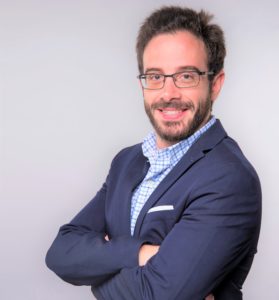Posted on February 11, 2021 by Wendy Frost
 Elias Bou-Harb, associate professor of information systems and cyber security at the UTSA College of Business, has been named the new director of The Cyber Center for Security and Analytics at UTSA.
Elias Bou-Harb, associate professor of information systems and cyber security at the UTSA College of Business, has been named the new director of The Cyber Center for Security and Analytics at UTSA.
“My vision for this university-wide center is to bring people and their complementary expertise together to increase our research productivity, innovate defensive and offensive cyber security tactics while devising state-of-the-art data analytical learning methods and train the next generation of data science and cyber security professionals,” said Bou-Harb, who previously served as associate director of the center.
Joining UTSA in 2019, Bou-Harb’s research focuses on operational cyber security and data sciences as applicable to national security challenges. He has authored more than 90 refereed publications and has been awarded more than $4 million in cyber security research grants. He is also a permanent research scientist at the National Cyber Forensic and Training Alliance of Canada, an international organization that focuses on the investigation of cybercrimes impacting citizens and businesses.
The Cyber Center for Security and Analytics focuses on research, development, operations and training in the area of applied cyber security and data science. The center has more than 15 affiliate faculty working on research in areas such as artificial intelligence, cyber forensics, data science and statistics, digital forensics and network security.
“Since its inception, the center has been one of the most productive in terms of research expenditures—with $1.8 million last fiscal year,” said Bou-Harb. “We’ve just received a $1.7 million grant from the Secret Service to support research in deep fake videos and Internet-of-Things (IoT) forensics.”
The center is currently funded through several federal, state and industry grants including support from the National Science Foundation, Air Force Research Laboratory, U.S. Department of Defense, Office of Naval Research, the U.S. Department of Homeland Security, Cisco Systems and CPS Energy.
Looking to the future, Bou-Harb would like to increase the exposure of the center with federal and state program managers as well as within the industry. He would also like to pursue more educational training grants that will empower the next generation of researchers and industry workers.
Working with the new National Security Collaboration Center, he envisions a free-flowing environment where all faculty in this field can collaborate.
“We are on the right path,” he said. “The landscape in this field continues to evolve. Malicious actors will continue to threaten our cyberspace and critical infrastructure, and we need to stay on top through the development of new techniques and tactics. UTSA and the Cyber Center are at the forefront of this and will continue to fight against various forms of online misdemeanors.”

